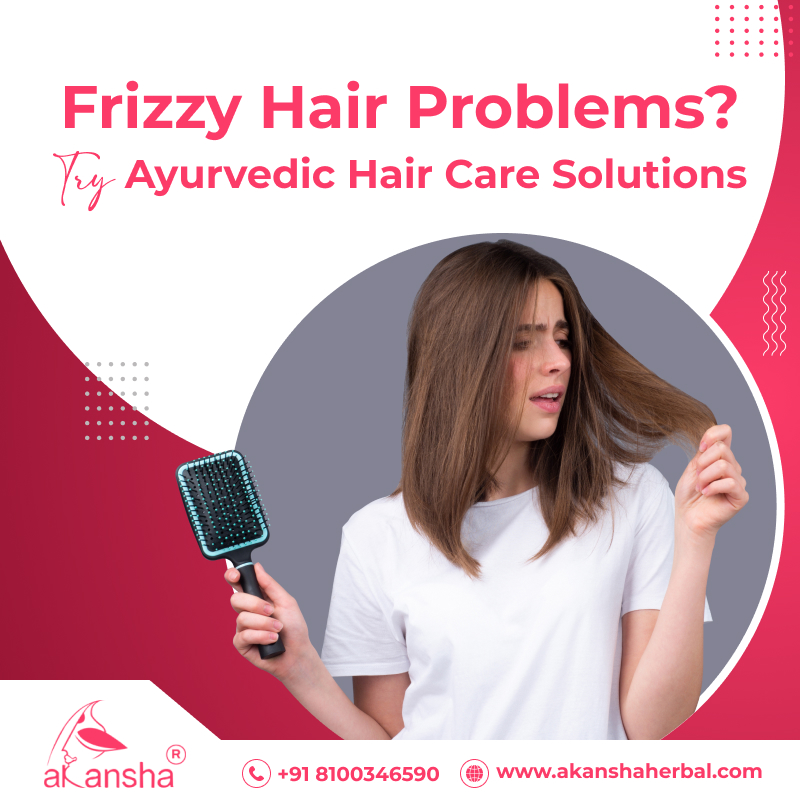Top 5 Tips to Create a Frizz-Free Ayurvedic Hair Care Routine for All Hair Types

Frizzy hair can be a persistent problem for many, particularly with fluctuating weather conditions. Without using harsh chemicals, Ayurvedic hair care products provide natural treatments that can help you control frizz, add shine, and encourage healthy hair development. For example, you can use Amla, Hibiscus, Tulsi, Fenugreek, and Neem for silky, frizz-free hair care routine. To know how to use them, have a look at this blog for the best tips.
The Tips to Keep Your Hair Frizz-Free with Ayurveda
Frizzy hair can be a persistent problem for many, particularly with fluctuating weather conditions. Without using harsh chemicals, Ayurvedic hair care products provide natural treatments that can help you control frizz, add shine, and encourage healthy hair development. For example, you can use Amla, Hibiscus, Tulsi, Fenugreek, and Neem for silky, frizz-free hair care routine. To know how to use them, have a look at this blog for the best tips.
The Tips to Keep Your Hair Frizz-Free with Ayurveda
- Amla: The Powerhouse of Vitamin C
Amla is popularly known as Indian gooseberry which consists of vitamin C and antioxidants that are essential for the health of the scalp and hair growth. It helps in the strengthening of the hair roots, reduces hair loss, and prevents frizziness by providing deep nourishment to the hair strands. The consistent application of amla oil or using amla hair treatments enhances the elasticity and sheen of the hair.
How to Use:
Amla Oil Massage: Apply warmed up amla oil to your hair and scalp. Wash it with a gentle shampoo after letting it sit for at least half an hour.
Amla Hair Mask: Make a paste out of amla powder and a small amount of water. Apply it to your hair and scalp and let it sit for 20 to 30 minutes, then rinse it off. - Hibiscus: The Natural Conditioner
Hibiscus is known for its conditioning characteristics, making it an excellent choice for frizz control. It contains amino acids that nourish your hair, reduce dryness, and increase natural hydration. Hibiscus also promotes hair development and strengthens the roots, improving overall hair health and reducing breakage. This is why most herbal products like Nabakuntal Hair Tonic use it as an active ingredient.
How to Use:
Hibiscus Hair Oil: You can use the aforementioned hair tonic or heat a mixture of dried hibiscus petals and coconut oil at home. Before using it as a hair oil, let it cool and strain.
Hibiscus Hair Mask: Also consider making a moisturising mask by blending hibiscus blossoms with yoghurt. Before washing it off, let it sit on your hair and scalp for 20 minutes. - Tulsi: The Scalp Saviour
Ayurveda holds Tulsi (Holy Basil) in high esteem for their capacity to improve the health of the scalp and to ward off dandruff and infections of the scalp. Tulsi is known to control frizz by promoting the overall health of the scalp thus preventing dryness and irritation of the scalp. Its calming effects also shield the hair from environmental assaults. If you are looking for tulsi-based hair care products, you can try using Keshchamak hair recovery conditioner for best results.
How to Use:
Tulsi Hair Rinse: To smooth hair and revitalise the scalp after shampooing, boil a handful of tulsi leaves in water, allow them to cool, and then use it for the final rinse.
Treatment of Tulsi and Oil: Make a paste out of the tulsi leaves and combine them with a carrier oil, such as almond or coconut oil. After applying to your hair and scalp, rinse after keeping it for 30 minutes. - Fenugreek: The Frizz Fighter
Fenugreek seeds or Methi is rich in protein and nicotinic acid, both of which are essentials for healthy, smooth hair. This traditional cure does have an effect on smoothing, moisture retention, and shining of hair. It calms the scalp through anti-inflammatory properties, hence good for sensitive skin as well.
How to Use:
Fenugreek Hair Mask: Make a paste out of overnight soaked fenugreek seeds, and then apply it to your hair. Before removing it with lukewarm water, let it sit for half an hour.
Fenugreek Oil: For deep conditioning, combine fenugreek seed powder with a carrier oil, reheat the mixture, and then apply it to your hair. - Neem: The Cleansing Hero
Neem is said to be antibacterial, antifungal, and anti-inflammatory, which makes it the best for keeping the scalp clean and healthy. Neem cures dandruff, prevents infections in the scalp, and eliminates itching. Neem encourages the health of the scalp, which strengthens the roots and reduces hair loss and frizz. Ayurvedic hair care products also consider adding neem to ensure this cleansing property for all hair types.
How to Use:
Neem Oil Massage: Before showering, massage the scalp with a few drops of neem oil diluted with coconut or olive oil, and let it sit for 15 to 20 minutes.
Neem Water Rinse: To cleanse and soothe the scalp, boil neem leaves in water, allow to cool, and then use as a last rinse.
Conclusion
Adding these Ayurvedic elements in your hair care practice, helps to reduce frizz and promotes smooth, healthy hair naturally. Regardless of the curl or wave or straightness of your hair, Amla, Hibiscus, Tulsi, Fenugreek and Neem will help you attain silky and non frizzy hair. Naturally let those locks be shinier, healthier and stronger—by embracing the goodness of Ayurveda!
- SHOW US SOME LOVE ON SOCIAL MEDIA
-


- FOR ANY HELP MAY CALL US AT+91 81003 46590+91 33 2475 5839 (Monday to Saturday 11 am to 6 pm)






